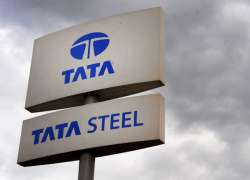Tata Steel decides to exit UK, Cameron calls emergency meeting to discuss matter
London: Tata Steel’s decision to put up its entire UK business for sale has put thousands of jobs at risk and also pushed the government into a tizzy. British Prime Minister David Cameron is likely to call for an emergency meeting on Thursday

London: Tata Steel’s decision to put up its entire UK business for sale has put thousands of jobs at risk and also pushed the government into a tizzy. British Prime Minister David Cameron has called for an emergency meeting on Thursday to discuss the matter.
Tata Steel, the second largest steelmaker in Europe, announced plans to sell UK business as it battles to control its "deteriorating financial performance", almost a decade after it bought steel giant Corus for over $14 billion.
The company has decided to "explore all options for portfolio restructuring including the potential divestment of Tata Steel UK, in whole or in parts" amid a "deteriorating financial performance of the UK subsidiary in the last 12 months".
The latest development also comes at a time when uncertainty persists over British economy ahead of the referendum in June to decide whether Britain should stay in the European Union or not.
The move puts thousands of jobs at risk. Tata's British business employs about 15,000 workers, including 4,000 at Port Talbot, the country's biggest steelworks. Tata's Port Talbot site alone, which employs 5,500 people, is estimated to be losing 1 million pounds a day.
As the British government looks at various options to salvage the situation, Cameron is likely to hold an emergency meeting tomorrow to discuss the fallout of Tata Steel's decision to sell its loss-making business in the UK.
According to British daily Telegraph, Cameron has decided to cut short his family holiday amid threat of job losses. Business minister Anna Soubry said the government was prepared to look at all the options to allow time for a buyer to be found to save thousands of jobs.
When asked on the BBC's Today programme whether the government would be prepared to nationalise Tata's remaining steel plants, she said: "We are, and have, and continue to look at, all options and I do mean all options.
"But what we first want to achieve is from Tata is this period of time to allow a proper sale process."
However, when pressed, she said there was a limit to what the government could do. "We have to be very careful because we have these state aid rules, which have been established for well over 50 years."
Tata Steel became Europe's second-largest steelmaker after acquiring Corus nine years ago.
Earlier, trade unions asked Cameron to save the crisis-ridden steel sector and demanded nationalization of the mills.
Commenting on the "uncertain future" of Tata Steel UK, Britain's biggest trade union Unite's general secretary Len McCluskey today said: "The growing chorus of calls for renationalization cannot be ignored by the Conservative government."
McCluskey said the message must go out now from the Prime Minister that he will take all steps to keep steel plants functioning and people in work.
"We are now in the grip of an industrial crisis. Decisions taken in the days to come will determine not just the future of 19,000 workers and their families, across 14 sites, but the very success of this government's own economic programme," he said.
This is the time for the government to say categorically that these assets will be taken into safe-keeping because without them the economy will not flourish, McCluskey said.
"The unity of voices, from business to government, to say that temporary nationalisation is the way forward must not be ignored. This helped save the Scottish plants. It has ensured that the Ilva plant in Italy survived. It must be deployed for the rest of the Tata operation," he demanded.
Roy Rickhuss, general secretary of Community, the largest trade union in UK steel industry, who held extensive talks with Tata Steel Board in the last two days in Mumbai, said the UK is now on the verge of a national crisis.
Tata Steel withdrawing completely from the UK risks destroying the entire steel industry. That would be a disaster both for those communities reliant on steel jobs and Britain's entire industrial base, he feared.
"Today, I am calling on David Cameron to meet with me urgently to discuss how his government and my union can work together to safeguard future of our steel industry. Community stands ready to play our part in averting that national crisis — the Prime Minister must now stand up and play his role too," he said.
Meanwhile, in a joint statement, the UK and Welsh governments said: "This is a difficult time for workers in Port Talbot and across the UK. During the review process, we remain committed to working with Tata and the unions on a long term sustainable future for British steel making.
"Both the Welsh and UK governments are working tirelessly to look at all viable options to keep a strong British steel industry at the heart of our manufacturing base."
(With PTI inputs)